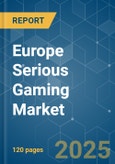Key Highlights
- The growing application in various end-user industries is driving the demand. Serious gaming finds applications in healthcare, where games are used for neurodevelopmental assessments of children. In defense, it is used for military simulations in virtual reality and tactical training.
- In addition, the increasing applications of the technology in defense training for critical scenarios may further augment the market over the coming years. For instance, the British Armed Forces use a VR training platform featuring gaming technology. The UK Ministry of Defence's (MoD) VR simulator platform is built on the Fortnite gaming engine and is expected to become part of a more comprehensive training program for the forces over the coming years. Such developments in the region are expected to increase over the coming years.
- Enterprise gaming systems are expected to witness substantial growth during the forecast period. Organizations have shown a heavy inclination toward collaborative approaches, which do not have a competitive environment, as they are widely considered counterproductive. For instance, Mint.com successfully experimented with gaming to drive high-profile leads.
- Games with a purpose other than just amusement are considered serious games. Frequently, the objective is to impart knowledge, alter behavior, or impart a skill. Games are fun, but if the player must consistently complete the same task to advance, you will rapidly lose their interest. So maintaining the game's enjoyment and interest presents a challenge for game producers.
- The COVID-19 pandemic resulted in increased usage of serious games. Government agencies were also using serious games to spread awareness about the pandemic, while educational institutes are looking at serious games to keep their students engaged and monitor their progress.
Europe Serious Gaming Market Trends
Improved Learning Outcomes Expected to Increase the Adoption of Serious Games
- Due to the COVID-19 pandemic's forced shutdown of educational facilities, internet and technology advancements became essential. This has increased the spread of smartphones and is fueling demand for such solutions.
- Since most students prefer to use their mobile devices, such as smartphones or tablets, from a technological perspective, Mobile Game-based Learning (MGbL) can be advantageous to teaching and learning in this direction. Additionally, from a pedagogical perspective, integrating gaming into the educational process can increase students' motivation for learning and improve their learning outcomes.
- The rise of mobile technologies presents opportunities to transform education by fusing game-based learning with mobile learning. Mobile game-based learning is what this is. Through gaming on mobile devices, MGbL offers a setting where students can study or evaluate their knowledge. As a result, people participate in it for educational and leisure activities.
- Additionally, regional government programs are utilizing gaming technologies for educational reasons. For instance, the LUDUS initiative seeks to use serious gaming to build a European network to exchange best practices and information. The Erasmus+ program of the EU co-funds the initiative.
Learning and Education to Witness Fastest Growth in the Forecast Period
- Over the recent past, digital games and simulations have gained popularity for being the most powerful and highly engaging learning environment. The production of these serious games requires complex and dynamic constructs with appropriate designs of multimodal context and exciting interactions, and productive pedagogical strategies to preserve learning efficacy.
- In the education and learning ecosystem, the need for game concepts, such as challenges, rules, scores, competition, and levels, is encouraging vendors to develop solutions to address and accommodate the principal pedagogical functional variables, such as instructional support, feedback, guidance, self-regulation, attention, cognitive flow, and assessment.
- Amid the COVID-19 pandemic, many countries across the region halted commercial operations, and most schools adopted online teaching methods. This trend continuing is expected to accelerate schools' adoption of serious games in the coming years.
- The adoption of virtual reality in training and development activities is expected to propel the growth of the serious games market across the region. Virtual reality is an artificial world made with software and presented to the user in a way that causes them to suspend belief and take it for granted that it is accurate. Virtual reality offers a learning environment where people may experiment with new skills, fail safely, learn from their errors, and advance professionally.
Europe Serious Gaming Industry Overview
The European serious gaming market is fragmented. It has many participants, with no corporation having complete market control. Serious Games Solutions, KTM Advance, and Diginext (CS Group) are significant competitors.In May 2022, Bedaux Serious Games company announced the successful training and educational training at AWL Techniek in Harderwijk, where Dynamics, tension, physical activity, and creativity are the basis of severe games in which participants are encouraged to experiment with business processes, leadership, and teamwork.
Additional Benefits:
- The market estimate (ME) sheet in Excel format
- 3 months of analyst support
This product will be delivered within 2 business days.
Table of Contents
Companies Mentioned (Partial List)
A selection of companies mentioned in this report includes, but is not limited to:
- BreakAway Games
- Designing Digitally Inc.
- Diginext (CS Group)
- MPS Interactive Systems
- Serious Games Solutions
- Tygron BV
- Triseum LLC
- KTM Advance
- Firsthand Technology
- Bedaux Serious Games








